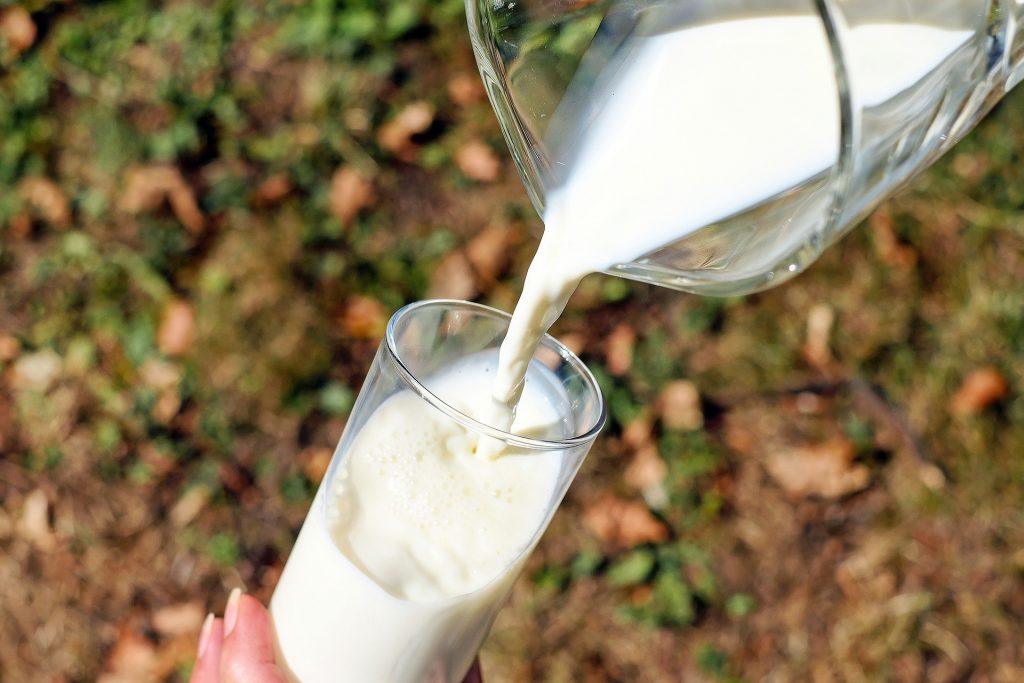 Colloquially, ‘milk’ usually refers to cow’s milk, but all mammals produce milk for their young. Mammalian milk serves an important function to provide both energy and nitrogen to the growing infant. In addition, immunity and brain development may be accelerated by the consumption of mother’s milk because of the important factors and chemicals it contains. Milk is therefore highly important for growing mammals including humans, and there is good evidence to suggest that breastfeeding is a superior to formula feeding in almost every respect. In particular, formula fed infants may have slower brain development and may be more susceptible to Western lifestyle diseases as adults. However, although the evidence that mammals milk is good for young mammals, the effects of milk on adult mammals including humans is less clear. In addition, it is not certain how healthy it is to consume milk from a different species as an adult, for example, cow’s milk as an adult human.
Colloquially, ‘milk’ usually refers to cow’s milk, but all mammals produce milk for their young. Mammalian milk serves an important function to provide both energy and nitrogen to the growing infant. In addition, immunity and brain development may be accelerated by the consumption of mother’s milk because of the important factors and chemicals it contains. Milk is therefore highly important for growing mammals including humans, and there is good evidence to suggest that breastfeeding is a superior to formula feeding in almost every respect. In particular, formula fed infants may have slower brain development and may be more susceptible to Western lifestyle diseases as adults. However, although the evidence that mammals milk is good for young mammals, the effects of milk on adult mammals including humans is less clear. In addition, it is not certain how healthy it is to consume milk from a different species as an adult, for example, cow’s milk as an adult human.

The effects of cow’s milk on long term health are not entirely clear. However, as milk is associated with a lower body weight, this may produce significant health effects for those who are overweight.
A number of studies have looked at the effects of cow’s milk on human health. These studies fall into a number of categories and taking each group in turn can help to elucidate the benefits or detrimental effects of drinking milk. Consistently, it has been shown that drinking milk is associated with a lower body weight and lower body mass index. That does not mean that milk is the cause of this effect, but evidence does tend to support this view. There are factors in milk that could explain its weight loss effects including conjugated linoleic acid (CLA), calcium, as well as the fact that milk slows the digestion rate which may have beneficial glycaemic effects. The calcium in milk may regulate appetite through its stimulatory effect on calcitonin, which can act as a satiety signal, Calcium may also bind to fatty acids and increase their excretion as insoluble soaps. In addition, a high calcium intake may improve insulin sensitivity through a mechanism that involves lowering the intracellular calcium concentration.
Therefore the calcium in in milk may have multiple mechanisms by which it is able to elicit effects on body weight. Low body weight is associated with good health and so milk may have benefits in this respect. Another aspect of milk that may be important is in the regulation of calcium homeostasis. Calcium is used in the formation of bone tissue and this has lead to speculation that milk is good for the teeth and bones. However, it is not clear as to the effect of milk on bone health and results from studies are not conclusive. This may be because the amount of calcium in the diet of milk drinkers is not high enough to cause an effect or because other factors in the milk, perhaps the protein, negate any beneficial effects of the calcium. Protein in the diet for example, can increase the acidity of the blood, causing a loss of calcium from bone tissue. Therefore the effects of milk on bone health are not clear, However, there are better dietary source of calcium, and bone health involves far more than just calcium balance.

The synthetic chemicals present in milk are a concern. They may accumulate in the adipose tissue of milk drinkers and have metabolic effects over time. Drinking organic milk may eliminate some, but not all, of these chemicals.
Milk may be a cause of inflammation. This will likely relate to the sensitivity of the individual and the amount of milk that is drunk. Milk contains arachidonic acid in the fat component and this accumulates in the cell membranes and acts as a precursor to proinflammatory eicosanoids. Some people appear to be highly sensitive to this inflammation, and this may be in part due to the food allergies many have to cow’s milk proteins. Milk is also a source of many toxins and drugs that are fed to dairy cows to help them stay free from disease and to allow them to produce large amounts of milk. Some of these chemicals may accumulate in fat tissue and cause metabolic effect over time. The exact effects of many of these chemicals are considered safe in isolation, but the combinations of these chemicals together and with other chemicals is never considered, and this may be how they could have detrimental effects in the long term. Drinking organic milk would eliminate the ingestion of some, but not all, of these chemicals.
RdB
